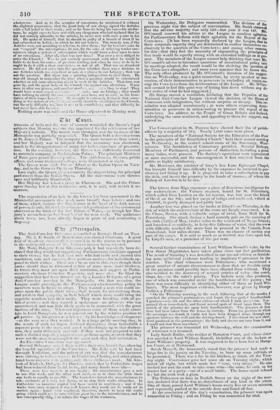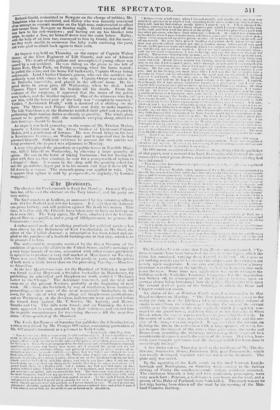Several fluffier examinations of Lord William Russell's valet, by the
Bow Street Magistrates, have taken place since our last publication. The result of Saturday's was described in our second edition as furnish- ing some additional evidence tending to implicate Courvoisier in the murder. The chief witnesses were Policemen ; who mentioned a great number of minute circumstances to show that no forcible entry of the premises could possibly have been effected from without. They also testified to the discovery of several articles of value—the watch, rings, &c.—in the valet's pantry. Two lockets were also produced, one of which was concealed under the hearthstone of the pantry ; but there was some difficulty in identifying either of them as Lord Wil- liam's. The most important evidence, however, was given by George Collier, a Policeman-
" On the Thursday morning, in the week following that of the murder, I searched the prisoner's portmanteau, and found the two pocket handkerchiefs 1 produce--one silk aml the other cotton—of which I took posses ion. I ex- aminee them immediately, and found several spots of blood upon them. The initials of the prisoner are upon both handkerchiefs. The prisoner at that time hail been taken from the house in custody. From the position in which the sovereign was found, it could not have been drollest down through any npert ere between the wall and the skirting-board, I also found the new shirt- front produced in the portmanteau : the body and sleeves arc torn from it, and 1 could not find them anywhere."
The prisoner was remanded till Wednesday, when the examination of witnesses was resumed.
Lady Sarah Baillie, who resides at Hampton Court, and whose sister was married to Lord William Russell, identified one of the lockets as Lord William's property. It was supposed to have been lost at Hamp- ton Court, or at It Mini:end. Sarah Mansell, the housemaid, stated that the prisoner had made a large fire in the pantry on the Tuesday, to burn up some rubbish, as
he pretended. There was a fire in the kitchen, as usual, all the Tues- day night. Courvoisier gave her some ale on Tuesday night; which tasted all right, but which made her " very, very sleepy.'' He also
invited her and the cook to take seine wine—the same, he said, as his master had at a party—out of a small bottle. The house-maid refused it ; but the cook took a glass.
The Policemen on duty in Norfolk Street on the night of the mur- der, declared that there was no disturbance of any kind in the street. One of them passed Lord Williatu's house every five or seven minutes, and repeatedly pushed at the outside door and found all fast. At the conclusion of this day's examination, the prisoner was again remanded to Friday ; and on Friday he was committed for trial.
Richard Gould, committed to Newgate on the charge of robbing Mr. Templeton who was murdered, and Bailey who was recently convicted Mau attempt to commit murder on the high seas, endeavoured to effect their escape from Newgate on Sunday night. Gould wrenched off the iron bars to his cell-windows ; and having cut up his blanket into strips, to make a line, let himself clown into the court below. Bailey', with the help of an iron bar, conveyed to him by Gould, did the same; but they were unable to surmount the lofty walls enclosing the yard, and were glad to climb back again to their cells.



























 Previous page
Previous page